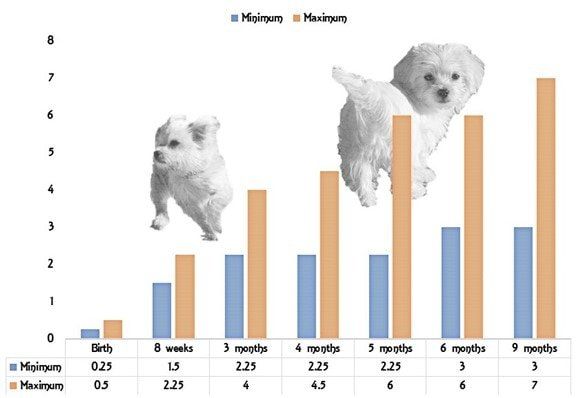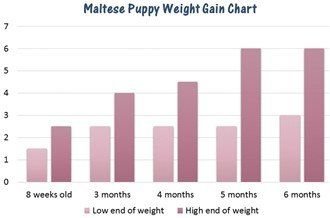Did you know that despite their small size, full-grown Maltese dogs can weigh surprisingly little? These elegant and fluffy companions may look like they have some weight to them, but in reality, they are known for their feather-like presence. So, just how much does a full-grown Maltese weigh?
The average weight of a full-grown Maltese dog ranges between 4 to 7 pounds. This breed is known for its petite stature and delicate build, making them one of the lightest dog breeds out there. Despite their small size, Maltese dogs are quite athletic and agile, often surprising people with their ability to jump and run. Their lightweight nature makes them perfect for snuggling and carrying around, making them ideal companions for those who are looking for a little bundle of joy that won’t weigh them down.
Curious about the weight of a full-grown Maltese? These adorable furballs typically weigh between 4 and 7 pounds. However, individual weights can vary based on factors like genetics, diet, and exercise. It’s important to note that maintaining a healthy weight is crucial for your pup’s overall well-being. If you have concerns about your Maltese’s weight, consult with a veterinarian to ensure they are on track for a happy and healthy life.
-330x218-960w.jpg)
How Much Does a Full Grown Maltese Weigh?
Welcome to our comprehensive guide on the weight of full-grown Maltese dogs. If you’re considering bringing a Maltese into your home or already have one, understanding their ideal weight can help you ensure their overall health and well-being. In this article, we’ll delve into the typical weight range of adult Maltese, factors that can affect their weight, and tips on maintaining a healthy weight for your furry companion. Let’s dive in!
1. Average Weight of Full Grown Maltese
The average weight of a full-grown Maltese typically ranges between 4 and 7 pounds. However, it’s important to note that there can be some natural variation within this range. Some Maltese dogs may weigh slightly less or slightly more, depending on factors such as genetics, overall health, and individual metabolism. It’s always best to consult with a veterinarian to determine the ideal weight range for your specific Maltese.
Maltese dogs are known for their petite size, and their weight is an important consideration for their overall health. Being excessively underweight or overweight can lead to various health issues, so it’s crucial to monitor their weight and adjust their diet and exercise accordingly.
Maintaining a healthy weight is vital for the well-being of your Maltese, as it can help prevent obesity-related conditions such as heart disease, diabetes, and joint problems. Regular visits to the vet, a balanced diet, and regular exercise are key to ensuring your Maltese stays within the healthy weight range.
2. Factors Affecting Maltese Weight
Several factors can influence the weight of a full-grown Maltese. These include:
- Genetics: Like humans, dogs inherit certain genetic traits from their parents, which can affect their size and weight.
- Diet and Nutrition: Providing your Maltese with a balanced diet that meets their nutritional needs is crucial for maintaining a healthy weight. Feeding them high-quality dog food, avoiding overfeeding or underfeeding, and incorporating appropriate portion sizes will contribute to weight management.
- Exercise: Regular exercise is essential for keeping your Maltese fit and maintaining a healthy weight. Engaging in activities such as walks, playtime, and mental stimulation exercises can help burn calories and prevent weight gain.
- Health Conditions: Certain health conditions or underlying medical issues can impact a Maltese’s weight. Hormonal imbalances, thyroid problems, or gastrointestinal disorders can sometimes lead to weight fluctuations. If you notice any significant changes in your Maltese’s weight, it is essential to consult with a veterinarian for proper diagnosis and treatment.
Understanding these factors can help you better manage and maintain your Maltese’s weight, ensuring their overall health and well-being.
3. Tips for Maintaining a Healthy Weight
To help your Maltese maintain a healthy weight, consider the following tips:
- Portion Control: Measure your Maltese’s food portions carefully and avoid free-feeding. Consult your veterinarian for guidance on appropriate serving sizes and feeding frequency based on your dog’s size, activity level, and age.
- High-Quality Diet: Feed your Maltese a balanced, high-quality dog food that provides the necessary nutrients without excessive fillers or additives. Look for reputable brands that cater specifically to small breeds.
- Regular Exercise: Engage your Maltese in daily exercise routines tailored to their size and physical capabilities. This can include walks, interactive play sessions, or other activities that keep them active and engaged.
- Veterinary Check-ups: Schedule regular check-ups with your veterinarian to monitor your Maltese’s weight, overall health, and discuss any concerns or changes you may notice.
- Avoid Overfeeding Treats: While treats can be a great way to reward your Maltese, be mindful of the calorie content and frequency of treat-giving. Opt for low-calorie treats specifically designed for small dogs, and adjust their daily food intake accordingly.
By following these tips and maintaining a balanced approach to your Maltese’s diet and exercise routine, you can help them achieve and maintain a healthy weight for a long and happy life by your side.
Additional Information on Maltese Weight
Factors to Consider
When it comes to the weight of a full-grown Maltese, there are a few additional factors to consider:
- Age: Puppies generally weigh less than adult Maltese, as they are still growing and developing. It’s important to follow their growth chart and monitor their weight with the guidance of a veterinarian.
- Gender: Male Maltese dogs tend to be slightly larger and heavier than females, although the difference is usually minimal.
- Breed Standards: Breed standards set by kennel clubs may provide specific weight ranges for Maltese dogs participating in dog shows or competitions. These standards may have slight variations from the average weight range mentioned earlier.
Keep these factors in mind when assessing your Maltese’s weight.
Consulting a Veterinarian
While this article provides general guidelines and information on the weight of full-grown Maltese dogs, it’s important to remember that every dog is unique. Consulting with a veterinarian who has experience with small dog breeds is crucial to accurately determine the ideal weight for your specific Maltese and address any concerns or questions you may have.
Your veterinarian can perform a comprehensive examination, offer personalized advice, and tailor a feeding and exercise plan based on your Maltese’s individual needs, considering their age, health, and lifestyle.
Summary
Understanding the weight of a full-grown Maltese is essential for providing the best possible care for your furry friend. The average weight range for adult Maltese is between 4 and 7 pounds, but individual variations can occur. Factors such as genetics, diet, exercise, and health conditions can influence a Maltese’s weight, making regular monitoring and veterinary guidance important. By following the tips mentioned in this article and consulting with your veterinarian, you can ensure that your Maltese maintains a healthy weight and lives a happy and fulfilling life by your side.
Key Takeaways: How Much Does a Full Grown Maltese Weigh?
- A full grown Maltese typically weighs between 4 to 7 pounds.
- Weight can vary based on factors such as genetics, diet, and exercise.
- It’s important to monitor your Maltese’s weight to ensure they are healthy and not overweight.
- Regular vet check-ups can help track your Maltese’s weight and ensure they are in good health.
- Feeding your Maltese a balanced diet and providing regular exercise will help maintain a healthy weight.
Frequently Asked Questions
Welcome to our FAQ section about the weight of a full-grown Maltese. Here, we’ll provide answers to common questions to help you better understand this topic. Keep reading to find out more!
1. How much does the average full-grown Maltese weigh?
The average weight of a full-grown Maltese typically ranges from 4 to 7 pounds. However, it’s important to note that individual dogs may vary in size and weight. Some Maltese dogs may weigh even less or slightly more than the average range.
Factors such as genetics, diet, exercise, and overall health can influence a Maltese’s weight. It’s always best to consult with a veterinarian who can provide personalized advice and guidance about your specific Maltese’s weight.
2. When do Maltese dogs stop growing?
Most Maltese dogs stop growing around 10 to 12 months of age, although some might continue to fill out until they reach 18 months. Their weight gain slows down significantly after the first year. At around 6 months, they are usually halfway through their growth process.
Remember, every dog is different, and factors such as genetics play a role in their growth patterns. Regular vet check-ups and proper nutrition are essential during this period to ensure your Maltese is developing healthily.
3. How can I help my Maltese maintain a healthy weight?
Maintaining a healthy weight is important for the overall well-being of your Maltese. Here are a few tips to help:
First, consult with your veterinarian to determine the ideal weight range for your specific Maltese. They can provide dietary recommendations tailored to your dog’s needs. Next, offer a balanced diet with the right amount of high-quality dog food. Avoid overfeeding or giving too many treats that could contribute to weight gain. Lastly, provide regular exercise such as daily walks or playtime to help keep your Maltese active and prevent excess weight gain.
4. Can a Maltese be overweight?
Yes, a Maltese can become overweight if they consistently consume more calories than they burn through physical activity. Overfeeding, an unbalanced diet, lack of exercise, and certain health conditions can contribute to weight gain in Maltese dogs. Obesity can lead to various health issues and decrease the overall quality of life for your beloved pet. Regular monitoring of their weight and body condition, along with a healthy lifestyle, can help prevent weight gain and keep your Maltese in optimal shape.
5. Are there any health risks associated with an overweight Maltese?
Yes, there are health risks that can be associated with an overweight or obese Maltese. Some potential risks include joint problems, heart issues, difficulty breathing, increased risk of diabetes, and reduced lifespan. It’s crucial to prioritize your Maltese’s health by monitoring their weight, providing a balanced diet, and ensuring they engage in regular exercise. Regular check-ups with a veterinarian are also important to catch any potential health concerns early on.

Summary
So, to sum it all up, the weight of a full-grown Maltese can vary quite a bit. On average, they tend to weigh between 4 and 7 pounds. However, some Maltese dogs can weigh as little as 3 pounds or as much as 10 pounds.
It’s important to note that a Maltese’s weight can be influenced by factors like genetics, diet, and exercise. So, if you’re considering getting a Maltese or already have one, make sure to provide them with a balanced diet and regular physical activity to help them maintain a healthy weight. And remember, every dog is unique, so consult with your veterinarian for specific advice regarding your furry friend’s weight.
